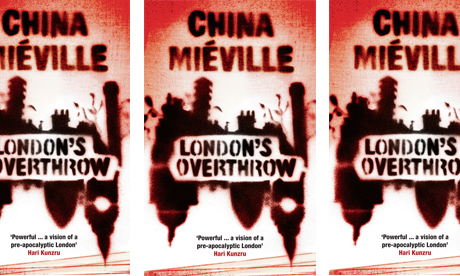London’s Overthrow – review
First things first. China Miéville is one of the most stupendous writers around. He pioneered a style of fiction he calls ‘new weird’.
The expansive imagination and intellect displayed in his award-winning novels such as Perdido Street Station, The Scar and The City and the City are unforgettable, but if you have never read anything by Miéville and want to start, don’t plump for this essay.
While Miéville’s best novels are full-blown thrilling fantasy rides largely unburdened by politics, this slim volume is an unapologetically angry polemic providing a strange little compendium of the mood in our city as it is wrenched by government cuts.
Miéville rages against Tory policies that are turning public housing into “a privilege, policed by gatekeepers.”
He writes: “In Paris, cheap housing is pushed out of sight of the boulevards, to the banlieues, the impoverished, underserved, tense suburbs… London has always been more of a medley, incomes jostling together. Now the poor are to be pushed centrifugally, faster and faster.”
Miéville, who once ran for election for the Socialist Alliance in the now superseded constituency of Regent’s Park and Kensington North, describes via thoughtful passages and shaky pictures snapped on his phone a city teetering on the brink of catastrophe.
His essay is named after a “scrappy, chaotic, inexpert, astounding” pen and ink scrawl by Jonathan Martin, an arsonist who was detained in Bedlam after setting York Minster alight in 1829.
Martin’s amazing, frightening drawing with its rampaging marauders, traumatised lion and burning London is reproduced amid Miéville’s text.
It is writing you want to keep reading, but the pre-apocalyptic schtick sticks in your throat, especially if you have already overdosed on works by Hackney’s very own Iain Sinclair (who incidentally is quoted by Miéville along with various other London figures including Stoke Newington’s Mike Marqusee).
Another problem is the timing of the publication of this little book. It dwells a lot on the riots and Occupy movement and seems to have been the result of Miéville’s crepuscular wanderings through London in November and December 2011. Perhaps the most depressive thoughts are only truly possible at night during the festive season, but some of the events described have already been superseded by newer ones, making parts of the text feel stale. Miéville’s excursus on the build up to the Olympics for example appears in need of a newspaper-style re-nose.
It seems almost morally wrong to say anything at all negative about a writer who is worthy of the highest recommendation and respect. There is an uncompromising and pugnacious feel about Miéville’s novels and stories, particularly the now famous Bas-Lag trilogy, the mark of an author prepared to upset the consensus. He is a fiercely original writer, which is why it is right to describe his fiction as revolutionary. However, his fantastical ‘new weird’ world has far more potency than this comparatively pedestrian tract.
China Miéville’s essay can also be read at London’s Overthrow.
London’s Overthrow
Westbourne Press
ISBN: 978-1-9089061-4-4
RRP: £7.99.

